

Homeless
We Are United to End Homelessness, Once and For All
for 95 years, Orange County United Way has improved people’s lives by focusing the caring power of our amazing community on its most critical needs.
Whether ensuring students can read or families have access to nutritious food and a roof over their heads, United Way has been there. It’s our unique role at the nexus of long-standing relationships with Orange County’s business, non-profit, philanthropic, government and education communities that have positioned us to lead local efforts to tackle important issues. And now, we have sharpened and significantly increased our focus on one of the most heartbreaking social issues to confront Orange County in recent memory—homelessness.
Like many others, United Way believes the time is now to collectively come together as a community to understand the causes and agree on the solutions to end chronic homelessness on our streets and in our neighborhoods.
United Way and our partners convened a “meeting of the minds” with key county officials and community leaders to thoroughly examine the challenge and identify what it would take to successfully combat homelessness here in Orange County. We then partnered with Jamboree, ACC-OC and others to commission the University of California, Irvine to conduct the nation’s most comprehensive Cost Study on Homelessness in our community.
United Way believes the time is now to collectively come together as a community to understand the causes and agree on the solutions to end chronic homelessness on our streets and in our neighborhoods.
—Susan B. Parks
United to End Homelessness was launched on February 28, 2018 to actualize the findings and recommendations from this pivotal Cost Study. Key among the findings was that Orange County could actually save $42 million if we were to place homeless individuals in supportive housing as opposed to continuing down the current path. Guided by leaders in other U.S. cities who successfully reduced chronic street homelessness by increasing their supplies of supportive housing, United Way convened an all-star Leadership Council to map out a measurable plan for success.
ilies Commission of Orange County, were main authors of the ten-year plan to end homelessness.
The County’s powerful efforts to add shelters, address the riverbed situation and endorse supportive housing initiatives under Chairman Andrew Do’s leadership have been represented by our county CEO, Frank Kim. In all, over 50 community leaders have joined this allstar Leadership Council, each bringing his or her own expertise and passion to help our county help those most in need.
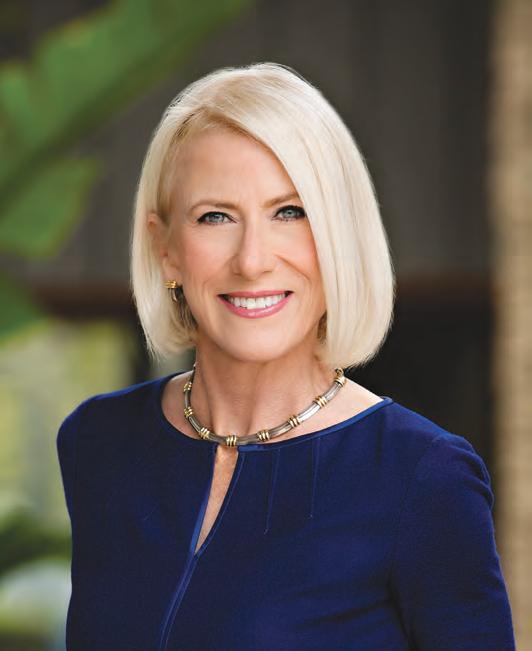
on many days is to find an open public restroom where he can clean up and shave.
When tents began proliferating along the Santa Ana River Trail, it was clear that all of us in Orange County needed to do more to solve the mounting homeless challenge. This is not just a government issue. Addressing homelessness requires a multi-faceted, holistic and community-wide approach.
Many members of the United to End Homelessness Leadership Council have been active in the progress Orange County has already made on this issue. Scott Larson from HomeAid led the Commission to End Homelessness. Lucy Dunn, CEO of the Orange County Business Council, and Kim Goll, Executive Director of the Children and Fam-
Much of our collective success will depend on how well we change the hearts and minds of Orange County residents. Most of the public dialogue thus far has centered on homelessness as a problem to be solved. This completely misses the vital human element.
We are grateful for the faith leaders that have come together to add their voice and compassion to our efforts and for the exceptional service providers who have been working tirelessly on this issue for years.
This whole issue is about people, people who need our help. People like Brian (featured on page 5), who suffers from MS that prevents him from maintaining the balance he needs to keep a stable job. He used to be a teacher with plans for the future. Now, his only hope
Brian and others are people like you and me who find themselves facing overwhelming challenges, without hope, without help, and are running out of time. Sadly, we’ve seen far too many homeless individuals take their last breath of life homeless on the streets of Orange County.
We must act now by establishing a countywide supportive housing system that will save financial resources and, more importantly, save lives. It’s the humane thing to do. It’s what we as a caring community must do. It’s what United Way has done for nearly a century in Orange County. Let’s all be United to End Homelessness, once and for all.
Susan B. Parks President and CEO, Orange County United Way
Susan B. Parks, President and CEO, Orange County United Way













Homeless Resources Throughout The County Building Pathways To End Homelessness In Orange County
Where do people turn if they are homeless or at risk of homelessness? What are the resources and programs the County has available to assist Orange County residents transition from homelessness to self-sufficiency? The County of Orange and its nonprofit partners are working together to ensure individuals experiencing homelessness receive assistance with health care, behavioral health, mainstream benefits, emergency shelters and housing, public safety, job training and placement. The county is making significant progress to build an effective System of Care with the help of cities and dedicated and united stakeholders. We encourage residents to learn more about the county’s efforts by visiting: www.ocgov.com/homelessness.
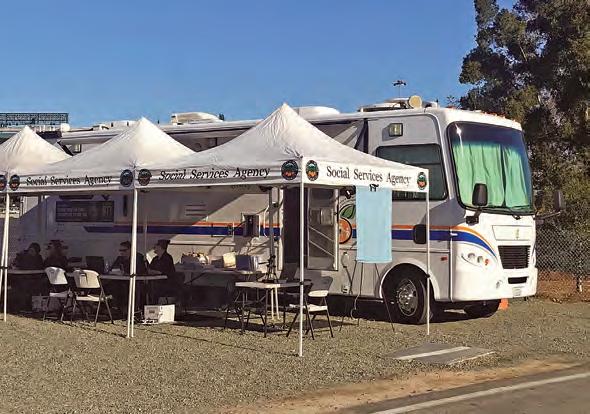
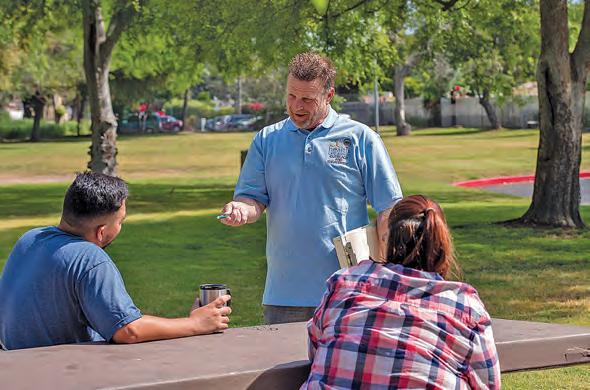
SHELTERS, AFFORDABLE HOUSING AND EMPLOYMENT
Seasonal Weather Shelters
Two Year-Round Full Service Emergency Shelters
Bridges at Kraemer Place
The Courtyard
Rental Assistance
Rapid Rehousing
Permanent Supportive Housing
Landlord Incentive Program
Employment Placement and Retention Services
HEALTH CARE & BEHAVIORAL HEALTH
Street Outreach and Engagement Teams
OC Links Information and Referral Line
Mental Health Crisis Assessment Teams (CAT)
Psychiatric Emergency Response Team (PERT)
Emergency Behavioral Health Centers
Mental Health and Substance Use Services
Public Health Services
MAINSTREAM BENEFITS
CalFresh
CalWORKS
Medi-Cal
General Relief
Restaurant Meals Program
Family Resource Centers
PUBLIC SAFETY
Sheriff Homeless Liaison Officers
Collaborative Courts
Faces and Voices of the Homeless

I do not want to be homeless. I have a son and I just feel like I’m letting him down. He should be in a better place. I have nowhere else to go, and I can’t lose him.
—Cassandra, a homeless mother in Orange County
Our Homeless Neighbors: Real people, real problems. These current and former homeless people didn’t choose living on the streets of Orange County.
A variety of misfortunes led to their plight.
She fights the voices in her head: Why don't you go drink?
Why don’t you just lose yourself and go do some drugs?
The voices come from a deep sense of sadness and frustration for Ana, a single mother of four who became homeless after suffering a series of health issues that forced her out of work and, ultimately, her home.
Ana tries her best to ignore the voices, and instead focus on her children.
Faced with no other option, Ana had to make the agonizing choice of placing her children in foster homes as she struggles to get back on her feet.
“It’s hard to stay positive,” says Ana, “especially when my 10-year-old is texting me at 11 p.m., ‘Mama, I miss you. Are we going to be with you anytime soon?’”
But stay positive she does. It’s her only hope, Ana says.
“My heart is with my girls,” says Ana, who recently got a job and is saving money to afford her own place – and, hopefully, get her children back someday.
She’s among the estimated 4,000-plus homeless in Orange County – many, like her, who ended up homeless not out of choice, or drug or alcohol addiction, but due to the harsh curveballs life sometimes hurls at people, seemingly indiscriminately.
Orange County United Way has launched a new campaign, United to End Homelessness, to shine the light on people like Ana who need help – and some basic compassion from others – to turn their lives around.
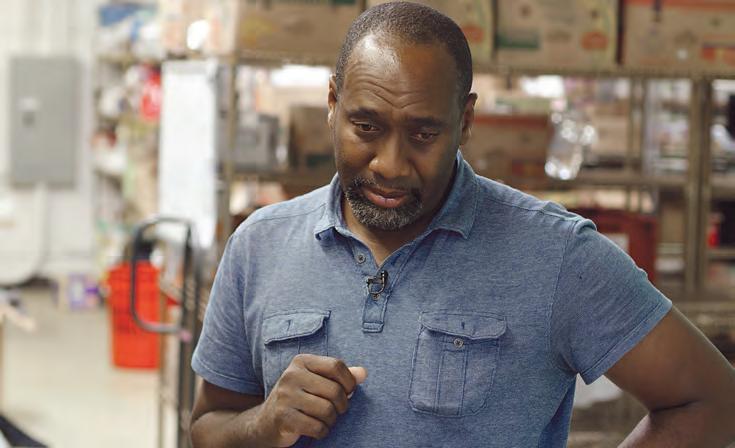
They include people like Ronell, a middle-aged man who has a job washing dishes but nowhere to go after his shift ends.
He’s been homeless for seven years, but says he’s working on saving money and pursuing more education to get a higher-paying job. Ronell says he had to leave his family behind when he no longer could afford to support them.
“I don't have friends and family out here,” says Ronell. “And the cost of living is high. So I have to work and sleep wherever I can.”
He doesn’t advertise to others he’s homeless.
“Sometimes … you don’t want other people to know it,” Ronell says. “My job is my saving grace … it helps alleviate
shame and (prevents) people (from) thinking I’m a charity case. If you work, you can maintain a certain level of dignity, a certain purchasing power.”
Of being homeless, Ronell says, “You adapt.”
But not having his own place to live is very difficult.
“There are a lot of times when I get off work I think, ‘Man, I wish I could find some place to lay my head, a place to sleep so I could be rested for the next day,” Ronell says. “Most people get off work and go home. When you’re homeless, you don’t have that (option). You have to find someplace.
“You have to stay awake, even though you’d like to go to sleep, like anyone else. I wish I had a place to go and sit
Ana (top photo), Ronell (bottom photo)
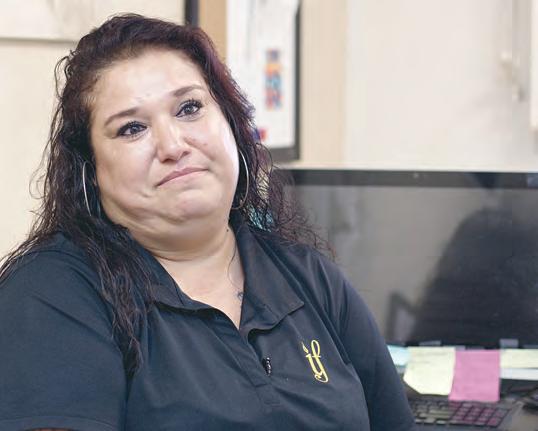

down and kick back and throw back a beer. But it doesn’t work like that (when you’re homeless).”
Angela had a career in property management for 15 years before things went south.
Now, she’s living in her car with her dog and her partner, who has been diagnosed with a mental illness.
For the last 18 months, this has been Angela’s life. “I’ve tried shelters,” she says, “but I prefer my car because there, at least I have some privacy and freedom to move around and stuff.”
Angela says she recently got on a list for rapid rehousing and now is trying to find a place to live.
She faces challenges.
Her state disability checks, she says, probably will run out in December. And among Angela’s many health issues are high blood pressure, diabetes, swelling of the legs, carpal tunnel syndrome, and osteoarthritis in a knee.
Angela says she’d love to find work as an administrative assistant or in customer service.
THE HARD REALITIES OF LIVING ON THE STREET.
“Sleeping in a car was hard. My kids would cry. There were nights when it was really cold. Seeing them in the back seat was really difficult.” — Monica, a single mother of six who now works for the Illumination Foundation.
“I think I’ve figured it out, but it’s so hard. I’ve always fought for the underdog. I mean you can’t get more underdog than the homeless.” — Brian, a former English as a Second Language (ESL) instructor at a prominent school in Taiwan who lost everything following the death of his mother and being diagnosed with multiple sclerosis.
“I’ve always dreamed of being in a place like this to renew my life, to be safe. It’s such a great, great gift. I’m very grateful and I don't take it for granted.” — Kim, a recovering methamphetamine addict who has been sober for more than 18 months and lives at Grandma’s House of Hope in Santa Ana. She says her addiction led to her homelessness.
“I’ve called a whole bunch of places. Everybody either has no availabilities or they don’t accept a couple with a kid, so it’s really hard. I do not want to be homeless. I have a son and I just feel like I’m letting him down. He should be in a better place. I have nowhere else to go, and I can’t lose him.” — Cassandra, often sleeps in a local park with her partner and young son, finding shelter on playground equipment, including a pretend fire truck.
For now, her car is her safe refuge.
“I have to drive around a lot and have gotten tickets,” she says. “It just doesn’t make any logical sense why (cities) would do something like that (ticket the homeless for living in their cars), other than the fact that they just don’t want us around. But we have to go somewhere.”
Getting somewhere other than where she currently is –homeless – is constantly on Ana’s mind.
It’s difficult, however, to stay positive, she says.
“I’m very heartbroken that my kids aren’t with me,” says Ana. “They’re my reason to wake up.”
She adds: “I don’t have words to express how I feel. I just feel like I’m playing a game that I’m never going to win.”
For more information, visit UnitedToEndHomelessness.org
HOMELESSNESS is caused primarily by lack of sufficient income or job loss combined with high costs of housing in Orange County. Other factors, like family dysfunction, health, and substance abuse, increase one’s vulnerability to homelessness.
40%
cite finding and keeping a job with sustainable wages
36% cite finding and keeping affordable housing
28% cite family issues, including domestic violence, death of a family member, family dysfunction and relationship dissolution
22% cite alcohol and/or drugs
17% cite mental health issues
13% cite physical health
7%
cite release from jail and/or prison
Monica (top photo), Brian (bottom photo)
Homelessness in OC:
There is a solution based on facts, academic studies and success in other cities. Housin g First is the answer to our community’s crisis.
There is hope. There is help.
Housing the Chronically Homeless Will Save
$42 MILLION A YEAR
It’s less expensive to house the homeless than to leave them on the streets.
Source: Homelessness in Orange County, The Costs to our Community
$299 MILLION was spent to address homelessness in Orange County by governmental and nongovernmental entities during the year studied, 2014-2015.
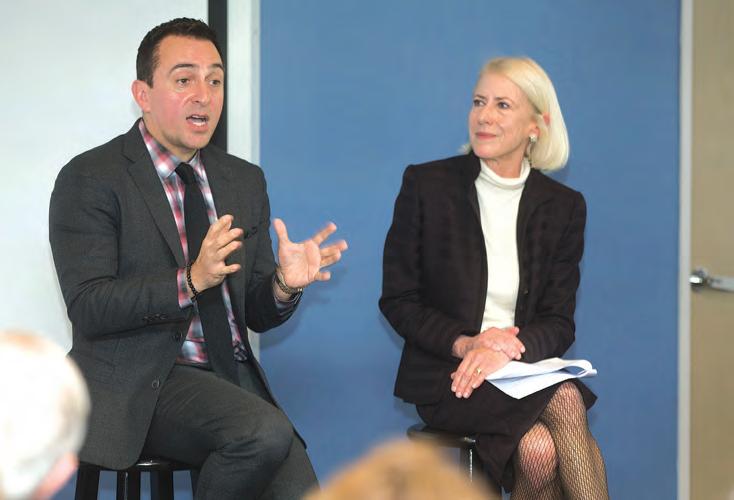
The Housing First Solution has a Proven Track Record
Some $121 MILLION of that was spent providing health care to the homeless.
$23 MILLION was spent on police, jail and prison. The average annual cost of services per homeless person is approximately $45,000. Those who need the most services (particularly health and medical care) drive that average up.
$106 MILLION was spent on all types of housing.
Caring for the chronically homeless is especially expensive, with the most needy incurring annual costs in excess of $440,000 per person. If the 10% of the homeless who use the most services are taken out of the analysis, the mean annual cost per homeless person for services drops to $10,000
Placing the chronically homeless in supportive housing significantly decreases the costs of caring for them and improves their overall quality of life. The U.S. Department of Housing and Urban Development (HUD) has designated “Housing First” as the recommended approach to providing housing for the homeless. Housing First prioritizes moving someone into supportive housing as quickly as possible so that they have a stable foundation from which to address other issues, such as finding employment or health related issues.
In Orlando, Florida, a “RETHINK HOMELESSNESS” campaign launched by Andrae Bailey helped change the way the city and region approached homelessness. Bailey has spoken at Orange County United Way events as part of the United to End Homelessness campaign, describing the success of Housing First in his community.
Bailey convinced elected officials, business leaders and the faith-based community to work together, and in doing so, they raised millions of dollars to fund the campaign.
Now, more than a thousand former homeless people live in supportive housing in the Orlando area. As a part of the program, they’re also given medical and mental care.
The annual point-in-time count of the homeless population showed a 23 percent drop in just one year. Central Florida reported that it had effectively ended chronic homelessness for veterans on the streets. In three years, Orlando and the greater Central Florida community have helped thousands get off the streets. In fact, many analyses have concluded that street homelessness in Florida’s Orange, Osceola, and Seminole Counties declined by as much as 50 percent in three years.
In Houston, the Housing First solution reduced the population of the city’s homeless by 75 percent in four years, and also effectively eliminated homelessness among U.S. veterans.
Marin County, California, has also adopted the Housing First solution, setting a goal of ending chronic homelessness by 2020.
Andrae Bailey, founder and CEO of Lead Homelessness, and Susan B. Parks, president and CEO of Orange County United Way
HOUSING THE HOMELESS WORKS!
PERMANENT SUPPORTIVE HOUSING (PSH), which combines affordable housing with supportive services such as behavioral health care services and mental health counseling, dramatically decreases overall service costs for this group.
Those in permanent supportive housing reported 78 percent fewer ambulance transports in the last month, and 100 percent fewer arrests, compared to those who are chronically homeless living on the street or in emergency shelters.
The estimated average annual cost of health services among the formerly homeless who are in permanent supportive housing ( $43,184 ) is less than half the annual cost incurred for the chronically street homeless ( $98,199 ).
Taking into consideration the average cost of services per capita, studies estimate a cost savings of approximately $42 million per year if all Orange County chronically homeless were placed into permanent supportive housing.
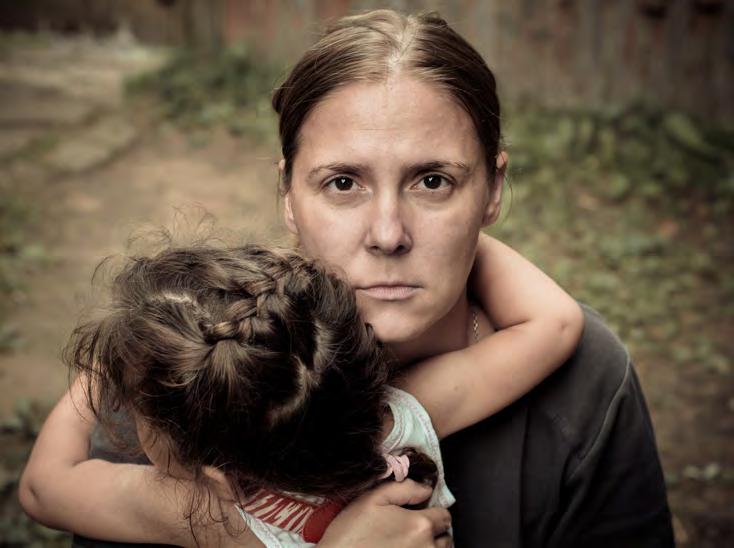
The Solution
United to End Homelessness
Orange County United Way has enlisted private and philanthropic partners, as well as various city officials, in a campaign to educate people about the causes of homelessness and the need to build more supportive housing. United to End Homelessness is focused on building public awareness and engagement in an effort to reduce resistance to housing the homeless in Orange County communities.
AreYou In?
#SupportiveHousingOC
AreYou In?
#SupportiveHousingOC
The goal is to add 2,700 Permanent Supportive Housing units in the next 36 months to five years, which would more than double the number of existing units in Orange County.
According to the most recent information from Orange County’s Housing Inventory Count (HIC), 1,724 adult-only Permanent Supportive Housing beds exist in OC. These units are typically at 100 percent of their capacity with long waiting lists. In fact, the 2017 HIC indicated a Permanent Supportive Housing waiting list of over 1,000 people
The campaign goals are to:
1. Rally community support for Permanent Supportive Housing and the Housing First solution.
2. Identify homes both through accessing existing rental units and working with partners to support and champion efforts to develop new units.
3. Work with the county, cities and others to gather information that helps the community gain insight in order to enhance the overall system of care.
Are you in?
For more information about United to End Homelessness and links to studies about homelessness in Orange County, and how to get involved, please visit www.unitedtoendhomelessness.org
WHAT WILL SUCCESS LOOK LIKE?
The achievable goal is for homelessness in Orange County to reach “functional zero”.
Functional zero recognizes that there will always be people who are homeless or at risk of becoming homeless, but as long as these people can be identified and re-housed quickly and effectively, the homeless rate will be effectively or functionally zero.
OC’s Business Community is United to End Homelessness
Since the launch of United To End Homelessness in February and the announcement of our goal to end homelessness in Orange County, many have asked me, “Isn’t that what government is supposed to do?”
My answer always starts with “Yes, and…”
Yes, government agency officials at the local, county, state and federal levels are working hard to combat and address homelessness, not just here but throughout the country. On behalf of everyone working on this initiative, we appreciate our partnership with these organizations. The local cities, the County of Orange, the U.S. Department of Housing and Urban Development and state officials are a significant part of the effort to bring about systemic change.
business community’s brightest and most entrepreneurial minds to engage in the campaign, applying their unique skill sets and business acumen to identify and actualize long-term solutions.
Because Orange County’s limited housing stock is overwhelmingly in private hands, the private sector property owners must be engaged to open up muchneeded housing units. It’s in these existing housing units, along with new facilities being considered for development around Orange County, where chronically homeless individuals need to be housed while receiving the supportive care to help stabilize their lives.
In Orlando, homelessness was cut in half in a little more than three years. We can do that here, too.
—Lawrence R. Armstrong
To end homelessness in Orange County, it will require participation from all of us – from business, philanthropic and governmental leaders to PTA and union volunteers and everyone in between – to step up and do our parts.
It was only when the private sector rallied in support of local government’s efforts in Orlando, Florida and Salt Lake City, Utah – to name just two – that change truly came about. In Orlando, homelessness was cut in half in a little more than three years. We can do that here too.
This will require the Orange County
Not only is this the most effective way to help those in need, it would cut the amount we spend each year on homeless services here in Orange County in half, according to a study by UC Irvine last year. It will also require the financial power of our business and philanthropic leaders to significantly expand the pool of private funding sources needed to complement – and in some cases attract – more government dollars.
Many of Orange County’s top private companies and foundations have come out strongly in support of United to End Homelessness, including Pacific Life, Kaiser Permanente, Union Bank, Bank of America, Tarsadia Foundation, Orange County Community Foundation and the Children and Families Commission.
Our United to End Homelessness Leadership Council members have been

volunteering countless hours for this important cause. The members include executives from Disneyland, Angels Baseball, and Wahoo’s, along with leaders who represent various sectors of the business community, including the Orange County Business Council, Apartment Association of Orange County, the Hospital Association of Southern California, and more.
We’re honored that so many of our community’s respected business leaders have stepped up to help raise awareness countywide. Perhaps more importantly, they’re mobilizing their employees to bring this campaign home to their
respective neighborhoods, to spread the word and educate their fellow citizens. They can then advocate in support of proven solutions to homelessness at their respective city halls and other local elected officials’ meetings. Imagine that taking place in every city throughout Orange County.
When that happens, we can truly say, as one county, “We are united to end homelessness!”
Lawrence R. Armstrong
CEO, Ware Malcomb
Chair, United to End Homelessness
Lawrence R. Armstrong, founding chair of United to End Homelessness, CEO of Irvine-based architecture and engineering firm Ware Malcomb
LEADERSHIP COUNCIL ROSTER
Rick Afable
Mind OC
Ashleigh Aitken
Aitken Aitken Cohn
Bob Alter
Seaview Investors, LLC
Charles Antis
Antis Roofing
Lawrence R. Armstrong
Ware Malcomb
Whitney Ayers
Hospital Association of Southern California
Bill Balfour Bank of America
Supervisor Lisa Bartlett
County of Orange
Judson Brown
City of Santa Ana
Matt Buck
California Apartment Association
Steve Churm
FivePoint Holdings LLC
Greg Custer
Whittier Trust
Mark Costa
Kaiser Permanente Orange County
Lucy Dunn
Orange County Business Council
Sr. Regina Fox
Sisters of St. Joseph Healthcare Foundation
Max Gardner
Community Member
Chancellor Howard Gillman
University of California, Irvine
Kim Goll
Children & Families Commission of Orange County
Ron Hasse
Southern California News Group
Dan Hedigan
Irvine Company
Julie Hill
Anthem Lord Abbett
Jeff Hittenberger
OC Department of Education
Shelley Hoss
Orange County Community Foundation
Sheriff Sandra Hutchens
Orange County Sheriff’s Department
Mayor Steve Jones
City of Garden Grove
Dr. Hans Keirstead
AIVITA Biomedical
Frank Kim
County of Orange
David Kim
The Bascom Group
Craig Kirkpatrick
Apartment Association Orange County
Dennis Kuhl
Anaheim Angels
Wing Lam Wahoo’s
Scott Larson HomeAid
Ethan Morgan
JP Morgan Chase
Mary Niven
Disneyland Resort
Sue Parks
Orange County United Way
Maya Patel Tarsadia Foundation
Lou Penrose
Apartment Association of Orange County
Asia Pham
Schroeder Management Company
Tom Rogers
MemorialCare
Mike Ruane
National Community Renaissance
Greg Saks
California State University, Fullerton
Ernie Schroeder
Schroeder Management Company
Grace Stepter
Anaheim Housing Authority
Heather Stratman Formerly of ACCOC
Todd Talbot Fluidmaster
Bill Taormina Clean City, Inc
Charlene Thomas UPS West Region
George T. Urch
Anaheim Ducks/Honda Center
Dan Young Camino Enterprises



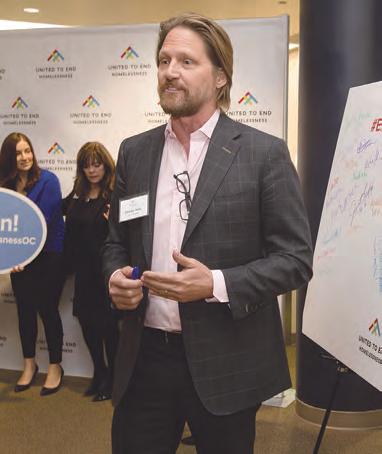

Angels Chairman Dennis Kuhl
Charles Antis, founder and CEO of Antis Roofing and Waterproofing, Inc.
Irvine Mayor Don Wagner, Susan B. Parks President and CEO OC United Way, UCI Chancellor Howard Gillman
Cinda and Steve Churm, Executive Vice President, Public Relations for FivePoint
Faith and Homelessness
As the United To End Homelessness Faith Leaders Council we believe:
● Every person and child experiencing homelessness possesses a divine dignity, known in some traditions as the image of God.
● We are called to love our human family and ensure that they are treated with dignity and respect.
● It is our moral imperative to provide housing, support and restoration for those experiencing homelessness.
Our faith traditions compel us to use our voices, platforms, and influence to bring attention to the homeless crisis in Orange County; use our relationships in the community to engage others in education, conversations, action and advocacy to bring forth solutions to end homelessness; pray AND act to end homelessness in our community.
A message about UNITED TO END HOMELESSNESS from Pastors RICK WARREN and KAY WARREN, co-founders of Saddleback Church.
l RICK: We’ve lived in Orange County for 38 years, and we’re excited that Orange County has joined the list of communities fighting to stem the tide of homelessness. It’s now reached crisis proportion and it dominates our local news. You’ve read these stories. These news stories tend to focus on the “problem” that needs to be “cleared out of the area,” or the lifestyle or the habit that led these people to their current conditions, or who’s to blame for letting this grow out of control.
l KAY: With a few exceptions, there’s little focus on the people who are suffering from conditions that, under different circumstances, could be you or me. A young woman or man who may be suffering from mental illness; a veteran suffering from PTSD; or a mother who—after fleeing abuse, losing her husband, or a job—faces an excruciating choice between paying for food for her children or paying rent. And now she’s on the streets.
l RICK: For months, we as a community have been paralyzed in the face of this mounting crisis. Meanwhile, 400 men, women, and children have died on the streets in Orange County in the past two years. Friends, it’s time that we unite to seek long-term and effective solutions to house the least fortunate among us.
l KAY: The Bible says in Leviticus 25:35 “If any of your people become poor and unable to support themselves, you must help them just as you are supposed to help foreigners who live among you.” We are called by our
maker to act. It’s not only the right thing to do; it’s what we as people of faith are called to do. Inaction or dismissing homelessness as someone else’s problem will only worsen this crisis and leave more vulnerable people on our streets.
l RICK: Now, it’s interesting that studies show that the longer people are left on the streets, the more their health declines and deteriorates. For instance, at 12 months on the street, about 50 percent of the population have no chronic health issues at all. When they’ve been on the street for three years though, 71 percent have at least one chronic condition and a third have three or more chronic health conditions. That’s the problem. This makes recovery much, much more difficult. What does this say about us as a society, as a community, as a people who care if we just leave those who are dying, who are sick, who are mentally ill and disabled just out there on the streets? This is the time to act now.
l KAY: We thank United Way for stepping up to bring the Orange County business, philanthropic, government, and faith-based communities together and focusing us all on the good fight against homelessness in our community, one that will restore dignity to the souls among us who are fighting for their lives everyday on the streets.
l RICK: We are 100 percent committed to this campaign. I want to ask each of you here today. Are you with us? Are you in? Join us today.
OC INTERFAITH LEADERS

Lisa Armony, Jewish Federation & Family Services
John Begin, Trellis
Pastor Steve Bieghler, Lamb of God Lutheran Church
Pastor Brenda Bos, Christ Lutheran Church
David Chrzan, Saddleback Church
Pastor D. Mark Davis, St. Mark Presbyterian Church
Curtis Drever, Irvine Presbyterian Church
Dr. Brad Fieldhouse, City Net
Local Mission Pastor Mitch Fierro, EvFree Fullerton
Erica Flora, Eastside Christian Church
Farrah N. Khan, Newport Mesa Irvine Interfaith Council
The Reverend Lester V. Mackenzie, St. Mary’s
Mike Penn, Orange County Interfaith Network
Pastor James Pike, Lutheran Church of the Resurrection
Janice and Mike Reger, Santa Clara de Asis Catholic Church
The Reverend Deacon Laura Siriani, St. Paul’s Episcopal Church
Senior Pastor John Steward, Mount of Olives Church
Reverend Karen Stoyanoff, Clergy and Laity United for Economic Justice OC
BJ Sullivan, Interfaith Council of Greater Rancho Santa Margarita
Tom Thorkelson, The Church of Jesus Christ of Latter-day Saints
Rabbi Marcia Tilchin, Jewish Collaborative of Orange County
Maribel Toan, Newsong Church
Greg Walgenbach, Roman Catholic Diocese
Pastor Doug Webster, The Following
Rabbi K’Vod Wieder, Temple Bethel of South OC
Reverend Sian Wiltshire, Orange Coast Unitarian Universalist Church
Here’s How You Can Help
Homelessness has grown to crisis proportions in Orange County. Too many of our fellow neighbors have lost hope. If we don't tackle this now through a comprehensive community-wide solution, it will spiral out of control.
The good news is there is a growing coalition of Orange County leaders United to End Homelessness.
Are You “In” to End Homelessness in OC?
Here’s what you can do:
1. JOIN US:
Check out UnitedToEndHomelessness. org and sign up to join our growing movement.
2. STAY INFORMED
Sign up on our website to receive important alerts and updates on the homelessness issue and what United to End Homelessness is doing to solve it. You can also follow us on Facebook , Twitter , Instagram and LinkedIn .
3. GET INVOLVED
Visit UnitedToEndHomelessness.org
to learn how you can help make a difference. Sign our Proclamation to End Homelessness or volunteer for our campaign. We need 2,000 volunteers on January 23, 2019 to ensure that every person experiencing homelessness knows that they count. The Point-in-Time Count being conducted that day helps us assess how many people are experiencing homelessness in our community and what their needs are. The results of the Pointin-Time Count shape Orange County’s approach to ending homelessness. Sign up on our website and join us!
4. LEARN MORE
There are many ways to become more informed about homelessness, none better than participating in one of our Homelessness 101 classes. Upcoming classes take place:
November 13: Mount of Olives Church in Mission Viejo
November 14: St. Paul’s Episcopal in Tustin
November 15: EvFree in Fullerton
All classes take place from 5:30 to 8 p.m
Visit UnitedToEndHomelessness.org for details or learn how you can register.
PARTNER SERVICE PROVIDERS
2-1-1 Orange County
American Family Housing
Build Futures
Crysalis
City Net
Families Forward
Family Assistance Ministries
Grandma’s House of Hope
HIS House Homeless Intervention Shelter
HomeAid Orange County
Illumination Foundation
Jamboree
Mental Health Association of Orange County
Mercy House
Orangewood Foundation
Our Father’s Table
Pathways of Hope
People for Housing - OC YIMBY
Precious Life Shelter, Inc.
Project Hope Alliance
Santa Ana Housing Authority
Serving People In Need, Inc. (dba SPIN)
Share Our Selves
South County Outreach
StandUp For Kids
The Kennedy Commission
The Orange County Burrito Project
The Salvation Army
Thomas House Family Shelter
WISEPlace
Are You “In” to End Homelessness in OC?
What can you do to help? Be part of the change!
● Keep an open mind and open heart about the homeless in our community
● Reach out to faith, civic, and corporate leaders to learn more about their support for United to End Homelessness
● Learn more about homelessness in Orange County, the Housing First solution and United to End Homelessness community campaign.
Learn more about homelessness in Orange County and United to End Homelessness community campaign at www.UnitedToEndHomelessness.org.
Then consider signing the following proclamation at the United to End Homelessness website.
Proclamation to End Homelessness
We, the undersigned, agree that… Every man, woman and child in Orange County should be treated with dignity and respect, including those experiencing homelessness.
Everyone experiencing homelessness has a unique background, life story, and circumstances that led him or her into their current circumstances.
We are willing to have our own preconceptions about homelessness challenged and reframed in our effort to seek real and lasting solutions.
Those in our community suffering from debilitating and disabling conditions that are chronically homeless should be provided with housing and all necessary support.
We must work together to solve homelessness; no one entity, including government, can do it alone. It will take all of us working together to #EndHomelessnessOC.
As a citizen of Orange County, I will do everything I can to ensure that integrated and sustainable solutions are implemented for my neighbors suffering from homelessness and, together, we can #EndHomelessnessOC.
Homeless

HOMELESSNESS.ORG
Orange County’s annual cost for the chronically homeless is:
$ 100,759 per person *
(Includes ER visits, law enforcement and other services)
Supportive housing cuts these costs almost in half to:
$ 51,587 per person *
(Includes housing and supportive services)
If all of our chronically homeless neighbors were able to access supportive housing, it could save us more than $42 million per year in homeless-related costs. As a united community, we can do it! By rallying our workforces, our community and our government leaders in support of this proven solution, we can end homelessness in Orange County.
Learn how at www.UnitedToEndHomelessness.org or use #SupportiveHousingOC.
United to End Homelessness is financially supported by:




